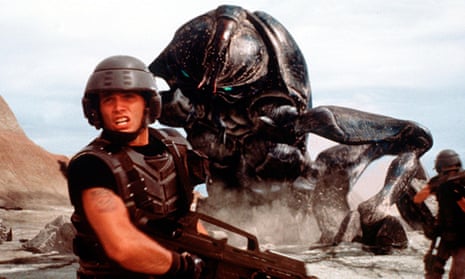There’s an image from Starship Troopers – 20 years old this week – that has been carved into the walls of my memory ever since I first watched it as an awestruck, acne-ridden teen.
Before this moment we had been treated to a pastiche of Hollywood military training set pieces – goofy recruits, locker-room banter, an unforgiving drill sergeant – propped up in front of cloying high school drama: saccharine romances, competitive sports and innocent musings on the future. And all performed by people who wouldn’t look out of place in an Abercrombie & Fitch advert.
Then, during a live fire exercise, our outlandishly chiselled protagonist Johnny Rico removes a faulty helmet from a fellow recruit to fix it, before a stray bullet chews the recruit’s head to pieces. Only a few moments before you had seen the cadet joking in the showers and mess hall; now his eyes were rolling into the back of an open skull, overflowing with bloody tissue, and the film’s sun-kissed sheen gets brutally, shockingly wiped away in a flash. And it’s brilliant.
This Paul Verhoeven sci-fi action satire is loosely based on the fiercely rightwing novel that shares its name. It follows Rico in mankind’s war with an alien species called “arachnids” or “bugs” after an attack destroys the whole of Buenos Aires, killing millions. They fight, they lose, they win, but by the end of the film the war is no closer a resolution than it was at the start.
At the time of its release in 1997, the usually febrile US military complex was going through a time of relative slumber, something hard to imagine now. The Gulf war was almost forgotten, Bosnia was winding down, and there were still a few years to go before 9/11 changed the world landscape for ever. Yet Verhoeven’s darkly humorous vision of a dystopian world with a hyper-jingoistic, ultra-violent attitude towards war, propaganda, foreign relations – putting a negligible value on human life – is becoming more and more relatable by the day. It is a world in which you only exist if you’re a fully functioning member of society, or “citizen of the Federation” in the film’s own terms.
The way the film foreshadows the “war on terror” is striking. A righteous war, caused by a seemingly unprovoked attack that kills multiple lives on our soil – later found to be in retaliation to an aggressively probing foreign policy? Check.
A horde of initially enthusiastic soldiers worn down by a less sophisticated but more cunning army that uses its surroundings to its advantage? Check.
Wave after wave of increasingly blunt methods of propaganda? Check.
Essentially, you could swap the word “bug” for “terrorist” in the film and you’d get the western media’s appraisal of the Middle East since the early noughties.
The film was greeted by scathing reviews from critics as esteemed as Roger Ebert, who called it “one-dimensional” and “pitched at 11-year-old science-fiction fans”. But when you watch it now, something I do pretty much on a bimonthly basis, you realise that for a film released in the nineties it’s incredibly sophisticated.
It’s not just that the special effects stand up incredibly well, but even the deliberately OTT acting – hammy and wooden in parts – accentuates the drama. When Rico says: “Dizzy was my friend, she was a soldier, but more than that she was a citizen of the Federation” – at a time when the character is meant to be feeling purely grief – his unwavering commitment to the overarching state hits home.
Verhoeven was praised to the gills by critics for RoboCop, another of his satires on the police state. Yet when he released a film that did so much to puncture the illusion of the military hero, the criticism was vociferous. The film may seem like a chest-thumping celebration of colonialism, a big primary-coloured drum being banged in favour of war’s eternal mastication, but actually it uses the brash tactics of propaganda to show up the ridiculousness of these ideas: ideas that are worryingly appealing to a society driven by ever more fervent tribalism.
